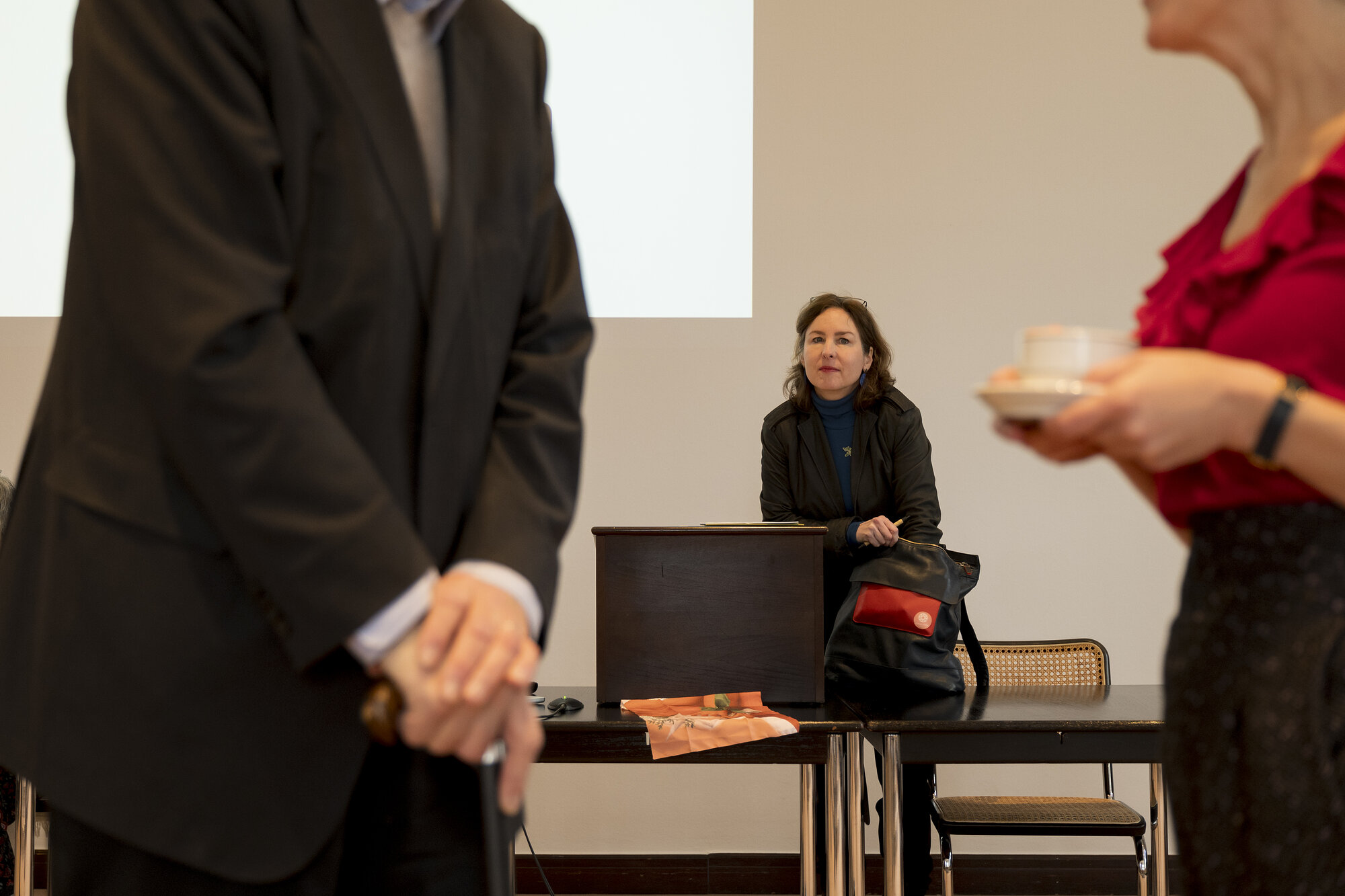Issue 19 / March 2024
“I am not idealizing solidarity”
Matthias Pfeffer
The political scientist Barbara Prainsack deals with the role of solidarity in contemporary societies. In conversation with the journalist Matthias Pfeffer, she explains her research on the topic of data solidarity in a time of digital upheaval
Matthias Pfeffer: We want to talk about solidarity, about your approach to data solidarity, and the importance it can have for our future dealings with digital industries or digitalization itself and above all with digitalization in an age of artificial intelligence. It seems to me that, here at least, we can no longer do without it. So let me start with a question. The sociologist Émile Durkheim distinguished between mechanical solidarity and organic solidarity. In abbreviated form, this means that mechanical solidarity is based on the shared preexisting characteristics of a group – for instance: we workers, we women, we Germans – whereas organic solidarity is based on dependency and of course the feeling of dependence on each other. Is this a definition that you can still relate to today?
Barbara Prainsack: When you’re dealing with solidarity there’s no getting around Durkheim because he was one of the first thinkers to comprehensively theorize the notion. And his work has received a lot of critique. In today’s debates it is often inserted in a truncated manner. For Durkheim the transition from mechanical to organic solidarity marked the changing relationship between the individual and society as the division of labor and the differentiation of society progressed. Solidarity precedes the emerging individual here. That’s something that is often forgotten today, partly because a prominent segment of the literature on solidarity in the English-speaking world remains very much beholden to an individualistic worldview. It’s a worldview which assumes that there are independent individuals who freely decide to show solidarity or not. Durkheim saw it differently – as do a large proportion of feminist and non-Western approaches. They assume that the identities and interests of people are formed through their relationships with others. We are “made” by our relationships. These are two completely different approaches to understanding human conduct – individualistic on the one hand, relational on the other. And these different perspectives on the world are an important background for different uses of the concept of solidarity. In my view, Durkheim is only of limited use for individualistic approaches; at the same time, it is impossible to imagine the history of solidarity scholarship without him. With mechanical solidarity, Durkheim referred to those societies in village communities where there was little division of labor, when the lives of many people were synchronized, when people rose more or less with the sun and went to sleep when it set. Cohesion, in this view, came through homogeneity and consonance. There was much that unified people – concern about the weather, about the next harvest. In very few contexts today, at least in the Western world, are there still communities where such large parts of life are synchronized and where one shares so many things with others. If anything, Durkheim’s organic solidarity is more applicable to today’s societies. In societies with a strong division of labor and a high degree of differentiation, solidarity is no longer a given. It comes about through mutual dependence and is something that must be worked for continuously. For Durkheim – and many thinkers after him – other conditions had to be met to make solidarity possible. For example, justice. Solidarity is impossible without a minimum level of justice. The relationship between solidarity and justice is still an important theme in the literature today. I also address this in the book I’m working on here at the Wissenschaftskolleg – particularly against the backdrop of the era of multiple crises that we find outselves in today.
MP: I understand exactly what you’re saying because I myself come from a small village where I experienced the seasonal rhythms. To a certain extent, if you want to use McLuhan’s metaphor, today we’re living in a global village. So, what really distinguishes our global village from the village in which this embedment functioned, as in Durkheim’s time?
BP: Today we do different things at different times. We know that synchronicity can bring about solidarity. What determines our daily routines now is usually no longer the light or the weather but our employers and our social and economic position. Many of us have also become more mobile, we move faster through space – and in many respects also through time. In a certain sense, time is condensed today. There are also synchronicities that create solidarity today, of course, but these are different from the ones in the past. As a result, other strands of solidarity scholarship have become more important – like the work of Jodi Dean or Carol Gould. They deal with the question of what connects people who are strangers to each other in many ways. Or Caesar Atuire’s scholarship which has become extremely influential in the global health context.
MP: Before we get to them, I would like to once more ask how solidarity can still play a role in a society that has become somewhat atomized – no doubt, here we can speak of Andreas Reckwitz’s society of singularities. Or rather, what role does solidarity play in a society that has become highly individualized due to digitalization, among other things?
BP: There is no universal answer to this question; instead there are major regional differences. In my work I differentiate between three levels of solidarity. The first level is the interpersonal one. Solidarity takes place at this first level when someone supports another person or a group because they feel connected to them in a certain way. If such acts of support then become normal practice within a group, then this is solidarity at the second level. And if these practices “solidify” into legal, bureaucratic, administrative or other binding social norms, then we have institutionalized solidarity – level three. So, depending on what level we are talking about, the answer to your question varies. Today, in highly individualized Western societies, it is often difficult to express solidarity at the first level, i.e. the interpersonal level. For solidarity ultimately means supporting those with whom one feels connected in some way. And feeling connected is easier in a society where people have many shared needs and interests because they have similar daily routines, values or other obvious commonalities. And the political discourse also plays an important role here. When you live in a society where the differences between people are constantly being stressed, where one group is pitted against another, it’s harder to recognize commonalities than in a society where commonalities are emphasized. In which – despite all those differences that invariably exist between people – institutions are geared toward protecting and strengthening that which everyone has in common – like the healthcare system, which is based on the concept that at some point we are all affected by illness and require help. At level three, the institutionalized level, we of course have a completely different situation in continental Europe and certain other regions where there are solidarity-based social-security systems than in countries without strong welfare states. Solidarity-based institutions are those to which people contribute what they can and receive support as they need it. The “design principle” of solidarity-based institutions is indirect reciprocity, not direct reciprocity. This distinguishes solidarity-based healthcare systems from private-insurance systems where the contributions are based on calculations of individual actuarial risk. Countries that have not established such social or welfare systems have in some cases developed other, non-governmental yet nonetheless institutionalized forms of mutual aid. It is also important to note that every inside has an outside. Every form of institutionalized mutual support has barriers to entry. In some cases these are discriminatory – for instance when people who are not of the “right” gender, the “right” nationality or the “right” religion are excluded. I am not idealizing solidarity – it is not always good. That’s an important point. When it comes to the moral evaluation of solidarity – and the question of how politically desirable it can be – a very important question is what criteria are used to determine inclusion and exclusion – and who ultimately establishes those criteria.
MP: But we don’t have just these two systems – the European welfare state and the libertarian freedom state. What about the third major system, the Chinese or Asian system, which is a more collective system than the American one; also a more collective system, in a negative way, than the European one? At a presentation of his book All under Heaven, the philosopher Zhao Tingyang once said that the West is caught in an ego trap. That’s a juicy statement because much of what we have just discussed – individualization, atomization – does also lead, of course, to an ego trap in thinking to a certain extent. Today’s social structure is perhaps the Internet and not the village or the city. The Internet also started out with the promise of connecting everything with everything else. In the best-case scenario, would that also be second-level solidarity? And simultaneously a maximum degree of apparent individual autonomy? After all, these connections that we enter into are all very non-binding – and in contrast to a very closed, traditional, solidarity system where one is also monitored to see whether one meets general standards. On the Internet this is mainly dominated by the large platforms, with very problematic economic business models behind them. They are partly superseding the institutions that can no longer do this. Is this a place of seeming solidarity or, in some cases, genuine solidarity? There are also positive phenomena – for example microcredits, crowdfunding, protest movements like the Arab Spring, etc.
BP: Yes, absolutely. Formal institutions are not the only place where solidarity happens. A lot of solidarity takes place at the first level, from person to person, outside of formal institutions. These days it takes place online or offline. We have no indications that person-to-person solidarity is necessarily all that much less in individualistic societies than in less individualistic societies. But it has different points of reference. These can be new synchronicities or new shared practices. I’m an opponent of digital exceptionalism in our thinking about solidarity – I oppose the idea that now that many of us are using digital technologies, everything is radically different. Digital technologies are frequently used by many people to do what they want to do anyway – namely, preserving their connection to others or expressing their disapproval of others. Digital technologies modify rather than radically change practices that create or hamper solidarity. So it’s here that I would see the digital domain as complementary to other spheres of action. At the same time, it’s a problem that we now have public spaces dominated by commercial actors who make money from people sharing fake news and hate. Crass images and bizarre stories bring and keep more people on the platforms, thus reaping greater profits than respectful exchanges and nuanced information. The solution is to create public digital spaces that are publicly owned and democratically controlled – and not simply more “content management.”
MP: You can’t get around the fact that ultimately someone must determine and legitimize the system under which communality is to be lived. Here we could actually discuss once more the notion of a third way in Europe as opposed to American individualism and Chinese collectivism. A system where communality, connectivity, self-determination and autonomy are equally relevant and play a role. That would also then of course be manifested in legislative procedures. Do you see this as a possibility, as an opportunity?
BP: Yes, but I’m a bit unhappy with the premise because I believe that the ascriptions “individualist” and “collectivist,” even if they are correct as tendencies, are very homogenizing and actually obscure our view of just how much heterogeneity there is in the United States and China. In the U.S., in particular, there are many solidarity movements. In China there are many things which run counter to this cliché of collectivism, but that is just the premise, as it were. The difficulty or the core issue is: Who wields the scepter? In China I would say it’s not just the state or party but certain large technology companies as well, in a complex configuration. The latter point, namely the complex interplay between corporate and state power, can be found in the United States as well – even if it functions according to different values and takes very different forms. It’s even the case in Europe that there is an alliance between public authorities and regulatory bodies and corporate interests. What I’d like to see from the European regulator at this point is for them to go beyond the framework of fair-market competition and to establish greater democratic control over digital technologies and infrastructures. And this includes creating public property, investing in technologies and infrastructures that are publicly owned and democratically controlled. I believe that this is currently very, very important for things such as Large Language Models (LLMs), for example, which are machine learning models that can generate or translate text and “communicate” with people. For if we see these LLMs or other, general-purpose Artificial Intelligence (AI) as critical infrastructures, then it is actually astounding that there is so little public investment here, that so many states are saying, okay, we’re simply using technologies that belong to private providers, which we don’t control and don’t understand. I chair the European Group on Ethics, a permanent advisory body of the European Commission. Last year we published a statement on democracy in the digital age in which we highlighted precisely this fact – that public bodies, in the fulfillment of public functions, increasingly rely on technologies owned by major quasi-monopolistic corporations. This means that both public expertise and democratic control are being lost. We are relinquishing ever more control over essential technologies and infrastructures. And I see this as an aspect that the European regulator has not sufficiently focused on, partly because it is stuck in the framework of fair-market competition. And I would assert that they don’t pay enough attention to this infrastructure level. What do you think?
MP: I see it the same way. It is always said that the AI Act is the first comprehensive legislative procedure in the world. That is true. But it is not the first ever legal framework, for the Chinese have also passed very strict, detailed laws. The interesting thing, however, is that these laws primarily protect the state from its citizenry. This means that the companies are strictly overseen if their AI does something that imperils the state order, while the rights of individual citizens play no role of course. This is the kind of AI regulation we shouldn’t want here.
BP: No.
MP: You can’t have this whole discussion without entertaining the question of power. After all, these digital platforms are increasingly asymmetrizing power in favor of large decision-making servers. And in our present AI age this is intensified because with AI a double problem remains unresolved. The American AI expert Stuart Russell calls it a problem of control. What he means is the technical control problem of machines that change themselves while they are doing something and only disclose to us later the secret of what they have done. This black box issue could be too much for us, he says. The pioneer of artificial intelligence, Alan Turing, also saw it this way. In a 1951 article for the BBC, he predicted that, “Once the method of machine thinking has begun, it will probably not take long for it to surpass our limited abilities.” His conclusion was: “As a consequence, sooner or later, we must assume that the machines would take control.” But we also have the problem of political control. AI is in the hands of a few large companies worldwide and is being used to serve their interests. It’s puzzling to me why we in democracy don’t deploy the means we have developed for breaking up monopolies in something like telecommunications, earlier in the steel sector, etc., in this highly sensitive information technology of all things, and where our individual self-determination is also at stake.
BP: Our intellectual property is at stake.
MP: Our intellectual property, but also our spiritual life. I would like to say that everything is being translocated and used to increase power. And we can’t, a democracy can’t, be indifferent to this because democracy is based on access to free information, which serves as basis for the free formation of opinion. And the formation of opinion issues in a free election, which legitimizes power in society. This is the deliberative model of a democracy, which is extremely jeopardized if the supply of information and the formation of opinion are used to increase clout and become non-transparent and monopolized, as is presently the case in the digital world. We should emphatically urge the institutions, above all the European Commission and the European Parliament, to undertake countermeasures. And we must actively shape things ourselves. This brings us to the issue of data solidarity. So if we were to shape this technology according to principles of the common good, we could leverage a great deal of potential that is now generally invoked but only ever implemented in the service of large companies and that would help us improve life in free democratic societies.
BP: You’re absolutely right. It’s not just about regulation in the sense of drawing red lines but also about shaping things. Of course we need much more: We need more public investment in research, technology and education that is not then just passed on, given away or sold to large corporations, but instead remains in public ownership and under democratic control. That’s important. And what data solidarity tries to achieve is actually a data-governance approach which ensures that the risks and benefits arising from digital practices are shared more fairly in our society and globally. Today it’s the case that digital practices create massive advantages but chiefly for those who are already well off, while the costs are borne by others. Data solidarity tries to distribute both the benefits and the risks more equitably. How does it do this? It is based on three pillars. First, data use should be made easier when it promises to generate great public value. This requires certain exemptions from regulatory requirements, and also public funding. The second pillar of data solidarity seeks to avoid harm – for instance, by effectively banning those practices that pose high risks to people or entire groups. And where harm cannot be avoided, the goal is to mitigate it. Many people these days who come to harm through data use have no access to legal remedies – for example, because they cannot prove who caused the harm. Such people must have low-threshold access to support everywhere in the world. That is not the same as reducing risks but an additional level of protection for people. And the third pillar of data solidarity is to ensure that where commercial profits are made with data – which in itself is legitimate – these profits must be shared to a greater extent than is the case today with the people and communities from whom this data originates. There must be more and better sharing of commercial profits here. Generally speaking, it’s also about creating a stronger focus on public value. With members of my reseach group and other colleagues at the University of Vienna, we have created an online tool for this purpose that helps anyone who is interested – citizen, company or agency – to determine how high the public value of certain data use might be. Broadly speaking, the public value results from weighing up the benefits and risks for certain people and groups. It’s in such a way that we can move away from a binary evaluation of whether something is in the public interest or not. Again and again, economically powerful players succeed in arguing that everything they do is in the public interest. The transition from public interest to a more nuanced judgment of public value makes it harder to game the system.
MP: That’s very persuasive. And it’s a view already shared in part by the European Commission. Can’t one also work with the concept of technology assessment here, actually a classic term from the high-risk technology of nuclear power? We have to do technology assessments for what is being developed and released onto the market, frequently as an immature product. What we would not do in the chemical or pharmaceutical industry, we do in the digital industry; products will be released onto the market that are completely open and can be further developed. Have a look at OpenAI as the latest instance of this. Simply unleashing an unfinished generative AI on humanity is a highly risky practice; we need to become much more aware of the fact that the consequential damage, the planned but also the unplanned social and human repercussions of such technologies are enormous and that we need to adopt higher safety standards. By the way, the digital discourse today is binary. It’s always plus or minus and our thinking is slowly resembling that. But we can think in shades of gray, we can differentiate, much more so than the machines can; we can also reflect and criticize and we do far too little of that. In looking at the information market, as a trained journalist, I wish that we would also apply this approach to ensure a sustainable supply of trustworthy information and news for citizens in a democracy. But I should like to touch on a second topic to conclude our conversation. Another sociologist or philosopher who draws heavily on Durkheim is Jürgen Habermas, who once defined solidarity as follows: Those who act in solidarity will put up with short-term disadvantages in the long-term interest, trusting that others will behave the same way in similar situations. I think that’s a very nice definition. And what I especially like in this definition is the word trust.
BP: That’s exactly what’s important.
MP: It’s the important hinge of society. But we seem to be losing this trust. Parties, organizations, trade unions, churches – all are losing their membership. And ever fewer people want to get involved in such institutions. How can we ensure mutual trust in the future?
BP: One can ensure trust by making sure that these institutions which enjoy trust don’t abandon their values. A classic example, to make this tangible, is the British healthcare system – the National Health Service. There are probably few institutions in the world that have enjoyed more trust than the NHS. If this institution, which was a paradigmatic case of institutionalized solidarity when it was created, is now, due to underfunding, being hollowed out from the inside and starting to sell patient data, then this has fatal consequences for solidarity because an institution that is considered the quintessence of solidarity is suddenly changing its values without anyone openly saying: Watch out! We no longer see data as something that belongs to patients in a moral sense but as an economic asset that we give to technology companies! This silent erosion of institutions also exists in welfare states. When welfare-state institutions and social-security systems no longer appear chiefly as support for people, but ultimately as disciplinary and punitive agencies, then this is damaging for trust in solidarity-based institutions. But if people trust that they’ll be supported when they need it, then it’s easier for them to practice solidarity. And it is also quite clear that if you’re preoccupied with your own survival in the literal or figurative sense, then you often have no time and opportunity to care for others. Good social and economic security for people is not a sufficient condition for solidarity but a necessary one for solidarity to remain stable. What I often hear now as a counterargument is that crises create so much solidarity, that it’s precisely under the worst circumstances that people display the most solidarity. Yes, but that only works for a short while. Every crisis, every tragedy that lasts for a very long time – we saw that in the pandemic – is quite trying for people. It’s very, very difficult for everyone to maintain this large measure of support for others and to preserve this constant outwardly directed focus and need to communicate in the long term if you’re burdened with your own emotional, economic or even physical survival. So, here too, good economic, social and other support for people is an important prerequisite for solidarity to be stable.
MP: And I think that the control and transparency of these institutions are just as important in a democratic process. So long as we’re talking Habermas, that maven of the public sphere, I’d like to add a little something. I would hope that in this second structural change of the public sphere, in which we find ourselves by virtue of the digital boom, we would also revive the awareness of how important it is that we rely on trust here, that we can exchange trustworthy information in the public sphere, that we count on trustworthy communication, where we can allow ourselves to form opinions freely and with impunity – that we still hold this up as the ideal of a society which creates the preconditions for power to be controlled and for fair and solidarity-based processes to take place in society. We need to do more in this respect. And I believe that there ought to be approaches at a very practical level. And we should point out to our politicians that they need to do more here. Actively.
BP: Indeed, as you quite rightly say, there are good approaches. For instance, there is much that you can criticize Shoshana Zuboff’s work for, but her approach of also viewing digital practices in the context of surveillance capitalism – not surveillance in the sense of controlling people as an end in itself but controlling them for the sake of financial profits – is very helpful. For me, Astra Taylor’s work on “manufactured insecurity” is one of the most important contributions to the current debates on populism and democratic backsliding. So there are many approaches here which can help.
MP: Ergo, we have less of an epistemological problem than one of implementation.
BP: We have an implementation problem and a regulatory capture problem. This exists when there is a strong interdependence between those who make the rules and those who profit from these rules. Lobbying as well as “revolving-door” politics are a problem, too. The lobbyists hire on with those companies whose interests they previously represented and, conversely, the companies recruit their people from parliaments and civil-society organizations. This contributes to a massive regulatory capture problem in this sphere, and I believe that in a few decades we will look back on this as we do today on Big Tobacco in asking how we could have allowed it to go on for so long, how the damage done by cigarette smoke could have been so trivialized. We will think about the harm caused by technology companies in exactly the same way. Of course it’s not a perfect comparison. There are also many positive effects that digital practices and technologies have. But for a great number of people these are already overshadowed by the negative consequences. Many of these problems would be avoidable if there was the political will.
Matthias Pfeffer is the Director of the Council for European Public Space
More on: Barbara Prainsack
Images: © Maurice Weiss





